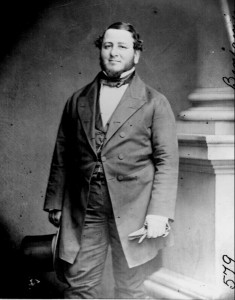From The New-York Times January 1, 1861:
… Secession Speech by Senator Benjamin, of Louisiana. Disgraceful Scene in the Senate Galleries …
WASHINGTON, Monday, Dec. 31.
The scene in the Senate to-day was the most intensely exciting that was ever witnessed in that chamber. Senator BENJAMIN, of Louisiana, who, it had been reported, would make a conciliatory speech, gave out that he would make a parting secession speech, — an announcement which drew an immense audience. Every corner was crowded. The lobbies were full. Senator BENJAMIN spoke calmly throughout, but the character of his speech at the close opened up to everyone the new era in national affairs. His closing declaration, that the South could never be subjugated, was greeted by the galleries with disgraceful applause, screams and uproar. It was evidently the act of persons who had purposely packed the galleries. For this demonstration the galleries were promptly cleared, but as the people passed out, remarks were current among the mob such as “That’s the talk ” — “Now we will have war” — “BENJAMIN’s a brick” — “D — n the Abolitionists” — “ABE LINCOLN will never come here.”
As the Civil War daily Gazette reported, The U.S. Senate Committee of Thirteen concluded on December 31, 1860 that there could be no compromises to keep the Southern states in the Union. Louisiana’s Senator Judah P. Benjamin alluded to that in his speech on the Senate floor.
You can read all of Benjamin’s speech here. Here are the last three paragraphs:
Now, Senators, this picture is not placed before you with any idea that it will act upon any one of you, or change your views, or alter your conduct. All hope of that is gone. Our committee has reported this morning that no possible scheme of adjustment can be devised by them all combined. The day for the adjustment has passed.
If you would give it now, you are too late.
And now. Senators, within a few weeks we part to meet as Senators in one common council chamber of the nation no more forever. We desire, we beseech you, let this parting be in peace. I conjure you to indulge in no vain delusion that duty or conscience, interest or honor, imposes upon you the necessity of invading our States or shedding the blood of our people. You have no possible justification for it. I trust it is in no craven spirit, and with no sacrifice of the honor or dignity of my own State, that I make this last appeal, but from far higher and holier motives. If, however, it shall prove vain, if you are resolved to pervert the Government framed by the fathers for the protection of our rights into an instrument for subjugating and enslaving us, then, appealing to the Supreme Judge of the universe for the rectitude of our intentions, we must meet the issue that you force upon us as best
becomes freemen defending all that is dear to man.
What may be the fate of this horrible contest, no man can tell, none pretend to foresee; but this much I will say: the fortunes of war may be adverse to our arms; you may carry desolation into our peaceful land, and with torch and fire you may set our cities in flames; you may even emulate the atrocities of those who, in the war of the revolution, hounded on the blood-thirsty savage to attack upon the defenceless frontier; you may, under the protection of your advancing armies, give shelter to the furious fanatics who desire, and profess to desire, nothing more than to add all the horrors of a servile insurrection to the calamities of civil war; you may do all this — and more, too, if more there be — but you never can subjugate us; you never can convert the free sons of the soil into vassals, paying tribute “to your power ; and you never, never can degrade them to the level of an inferior and servile race. Never! Never!


Great photo of Benjamin. He’s the only person from this era that I’ve seen smiling in a photograph. I’m not sure if he was just a happy fellow or was naturally smiley. Fiery orator though.
Thanks for the comment, Eric. It’s interesting that he is smiling and is not doing a Napoleon impersonation. I’ve read that, at the time, subjects had to maintain a pose for several minutes while the photograph developed. I’m not sure if that had anything to do with it or not.
Pingback: More Disunion in New York | Blue Gray Review